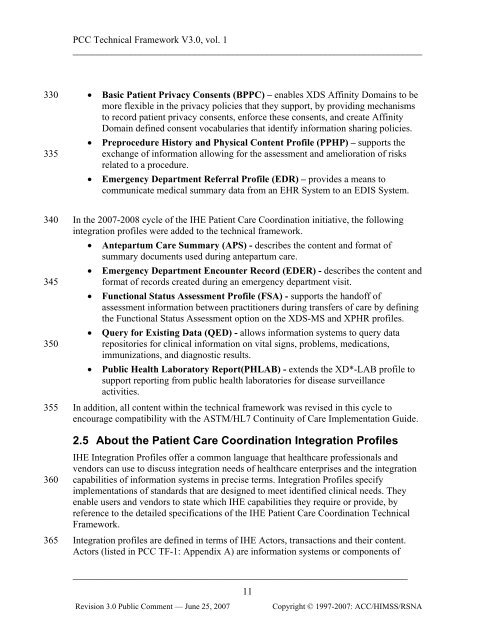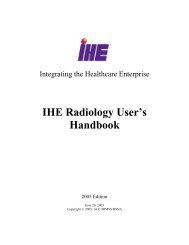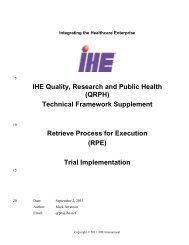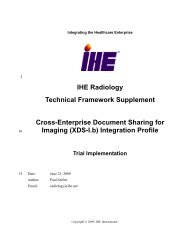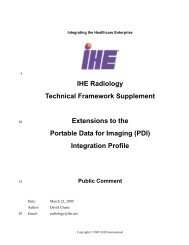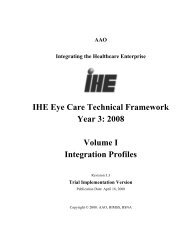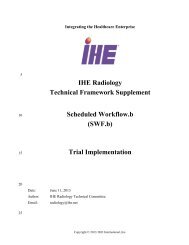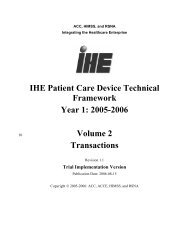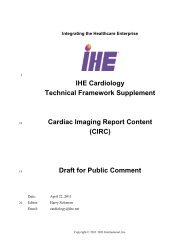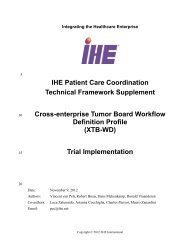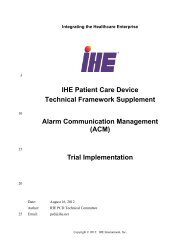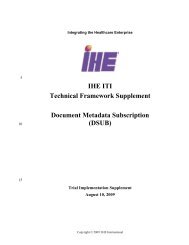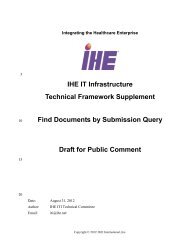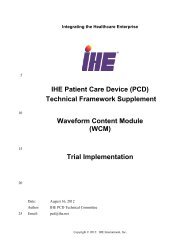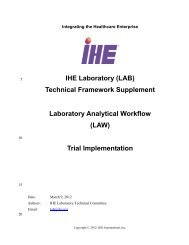IHE Patient Care Coordination Technical Framework Vol I
IHE Patient Care Coordination Technical Framework Vol I
IHE Patient Care Coordination Technical Framework Vol I
You also want an ePaper? Increase the reach of your titles
YUMPU automatically turns print PDFs into web optimized ePapers that Google loves.
PCC <strong>Technical</strong> <strong>Framework</strong> V3.0, vol. 1<br />
________________________________________________________________________<br />
330<br />
335<br />
• Basic <strong>Patient</strong> Privacy Consents (BPPC) – enables XDS Affinity Domains to be<br />
more flexible in the privacy policies that they support, by providing mechanisms<br />
to record patient privacy consents, enforce these consents, and create Affinity<br />
Domain defined consent vocabularies that identify information sharing policies.<br />
• Preprocedure History and Physical Content Profile (PPHP) – supports the<br />
exchange of information allowing for the assessment and amelioration of risks<br />
related to a procedure.<br />
• Emergency Department Referral Profile (EDR) – provides a means to<br />
communicate medical summary data from an EHR System to an EDIS System.<br />
340<br />
345<br />
350<br />
355<br />
In the 2007-2008 cycle of the <strong>IHE</strong> <strong>Patient</strong> <strong>Care</strong> <strong>Coordination</strong> initiative, the following<br />
integration profiles were added to the technical framework.<br />
• Antepartum <strong>Care</strong> Summary (APS) - describes the content and format of<br />
summary documents used during antepartum care.<br />
• Emergency Department Encounter Record (EDER) - describes the content and<br />
format of records created during an emergency department visit.<br />
• Functional Status Assessment Profile (FSA) - supports the handoff of<br />
assessment information between practitioners during transfers of care by defining<br />
the Functional Status Assessment option on the XDS-MS and XPHR profiles.<br />
• Query for Existing Data (QED) - allows information systems to query data<br />
repositories for clinical information on vital signs, problems, medications,<br />
immunizations, and diagnostic results.<br />
• Public Health Laboratory Report(PHLAB) - extends the XD*-LAB profile to<br />
support reporting from public health laboratories for disease surveillance<br />
activities.<br />
In addition, all content within the technical framework was revised in this cycle to<br />
encourage compatibility with the ASTM/HL7 Continuity of <strong>Care</strong> Implementation Guide.<br />
2.5 About the <strong>Patient</strong> <strong>Care</strong> <strong>Coordination</strong> Integration Profiles<br />
360<br />
365<br />
<strong>IHE</strong> Integration Profiles offer a common language that healthcare professionals and<br />
vendors can use to discuss integration needs of healthcare enterprises and the integration<br />
capabilities of information systems in precise terms. Integration Profiles specify<br />
implementations of standards that are designed to meet identified clinical needs. They<br />
enable users and vendors to state which <strong>IHE</strong> capabilities they require or provide, by<br />
reference to the detailed specifications of the <strong>IHE</strong> <strong>Patient</strong> <strong>Care</strong> <strong>Coordination</strong> <strong>Technical</strong><br />
<strong>Framework</strong>.<br />
Integration profiles are defined in terms of <strong>IHE</strong> Actors, transactions and their content.<br />
Actors (listed in PCC TF-1: Appendix A) are information systems or components of<br />
_____________________________________________________________________<br />
11<br />
Revision 3.0 Public Comment — June 25, 2007<br />
Copyright © 1997-2007: ACC/HIMSS/RSNA


